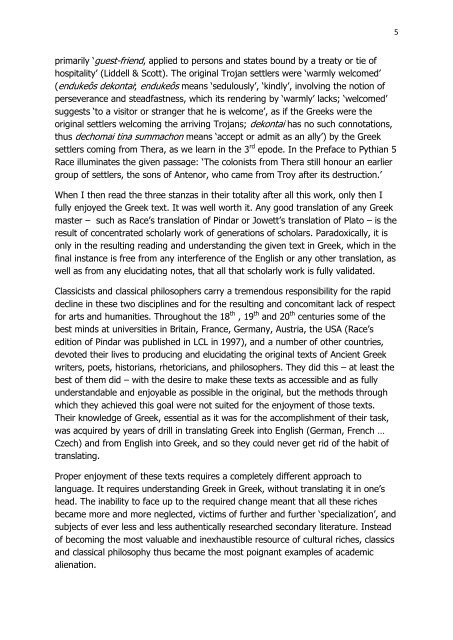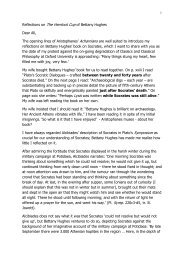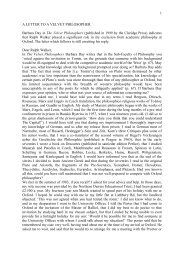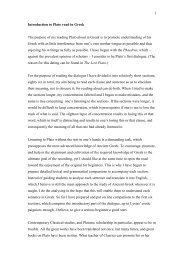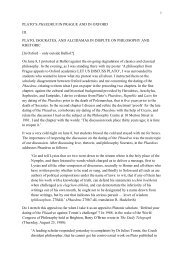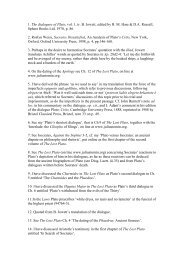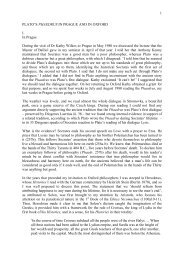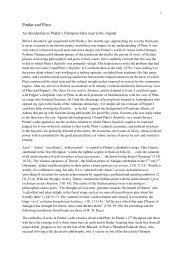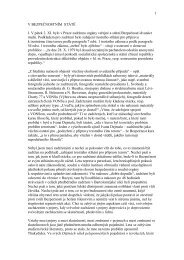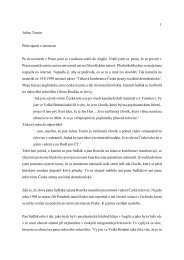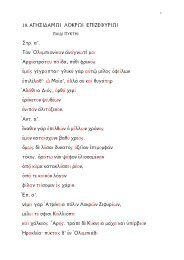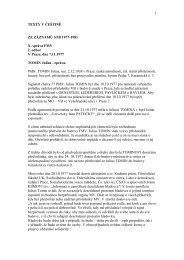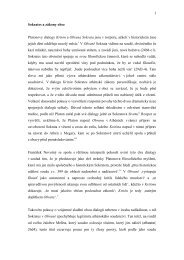ANOTHER PROTEST AT BALLIOL? I. Dear All, Allow ... - Julius Tomin
ANOTHER PROTEST AT BALLIOL? I. Dear All, Allow ... - Julius Tomin
ANOTHER PROTEST AT BALLIOL? I. Dear All, Allow ... - Julius Tomin
You also want an ePaper? Increase the reach of your titles
YUMPU automatically turns print PDFs into web optimized ePapers that Google loves.
5<br />
primarily „guest-friend, applied to persons and states bound by a treaty or tie of<br />
hospitality‟ (Liddell & Scott). The original Trojan settlers were „warmly welcomed‟<br />
(endukeôs dekontai; endukeôs means „sedulously‟, „kindly‟, involving the notion of<br />
perseverance and steadfastness, which its rendering by „warmly‟ lacks; „welcomed‟<br />
suggests „to a visitor or stranger that he is welcome‟, as if the Greeks were the<br />
original settlers welcoming the arriving Trojans; dekontai has no such connotations,<br />
thus dechomai tina summachon means „accept or admit as an ally‟) by the Greek<br />
settlers coming from Thera, as we learn in the 3 rd epode. In the Preface to Pythian 5<br />
Race illuminates the given passage: „The colonists from Thera still honour an earlier<br />
group of settlers, the sons of Antenor, who came from Troy after its destruction.‟<br />
When I then read the three stanzas in their totality after all this work, only then I<br />
fully enjoyed the Greek text. It was well worth it. Any good translation of any Greek<br />
master – such as Race‟s translation of Pindar or Jowett‟s translation of Plato – is the<br />
result of concentrated scholarly work of generations of scholars. Paradoxically, it is<br />
only in the resulting reading and understanding the given text in Greek, which in the<br />
final instance is free from any interference of the English or any other translation, as<br />
well as from any elucidating notes, that all that scholarly work is fully validated.<br />
Classicists and classical philosophers carry a tremendous responsibility for the rapid<br />
decline in these two disciplines and for the resulting and concomitant lack of respect<br />
for arts and humanities. Throughout the 18 th , 19 th and 20 th centuries some of the<br />
best minds at universities in Britain, France, Germany, Austria, the USA (Race‟s<br />
edition of Pindar was published in LCL in 1997), and a number of other countries,<br />
devoted their lives to producing and elucidating the original texts of Ancient Greek<br />
writers, poets, historians, rhetoricians, and philosophers. They did this – at least the<br />
best of them did – with the desire to make these texts as accessible and as fully<br />
understandable and enjoyable as possible in the original, but the methods through<br />
which they achieved this goal were not suited for the enjoyment of those texts.<br />
Their knowledge of Greek, essential as it was for the accomplishment of their task,<br />
was acquired by years of drill in translating Greek into English (German, French …<br />
Czech) and from English into Greek, and so they could never get rid of the habit of<br />
translating.<br />
Proper enjoyment of these texts requires a completely different approach to<br />
language. It requires understanding Greek in Greek, without translating it in one‟s<br />
head. The inability to face up to the required change meant that all these riches<br />
became more and more neglected, victims of further and further „specialization‟, and<br />
subjects of ever less and less authentically researched secondary literature. Instead<br />
of becoming the most valuable and inexhaustible resource of cultural riches, classics<br />
and classical philosophy thus became the most poignant examples of academic<br />
alienation.


